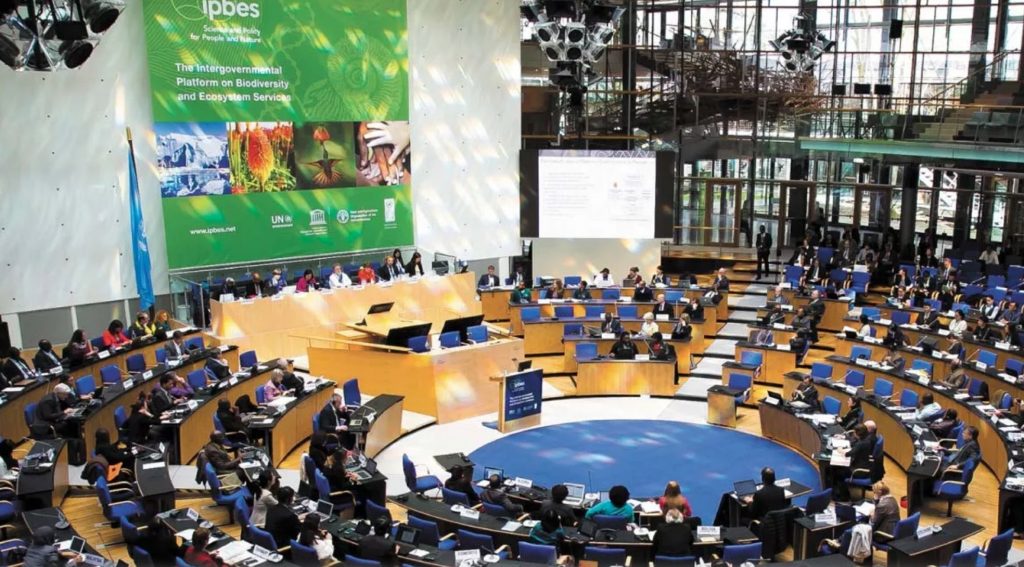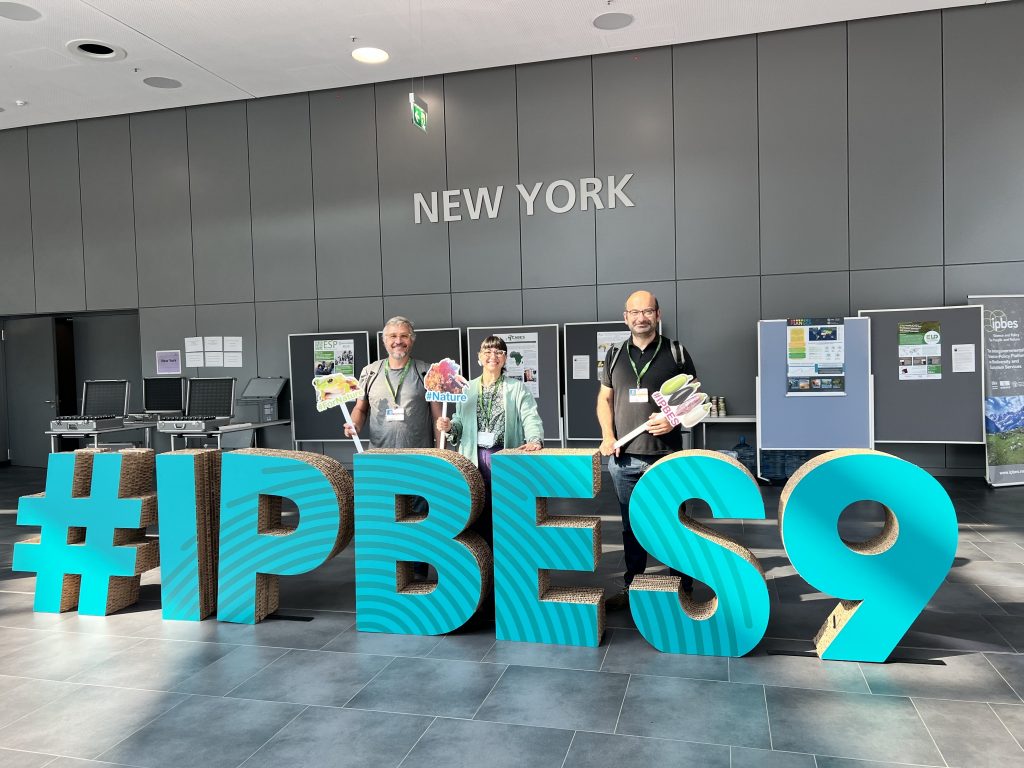CREAF, an observer organization at the ninth session of the Plenary of the Intergovernmental Science-Policy Platform on Biodiversity and Ecosystem Services (IPBES)
CREAF is firmly committed to environmental science diplomacy and support for public policies. After participating in the latest Intergovernmental Panel on Climate Change (IPCC) report, CREAF is currently acting as an Intergovernmental Science-Policy Platform on Biodiversity and Ecosystem Services (IPBES) observer organization. Alicia Pérez-Porro, CREAF’s scientific coordinator and an expert in environmental and science diplomacy, and Lluís Brotons, a CREAF and Spanish National Research Council (CSIC) researcher who is an active member of IPBES and has contributed to a number of its reports, have travelled to Bonn (Germany) to represent CREAF at the ninth session of the IPBES Plenary.
IPBES plays a similar role to the IPCC but with a focus on biodiversity. It harnesses expertise from across the scientific community and works to provide policymakers with the best scientific evidence available to guide their decisions. IPBES monitors the health, biodiversity and essential services of ecosystems, produces reports, and advises governments on the policies they should adopt to restore nature and recover all the functions it has lost in recent times due to human activity. The Platform’s motto is “Science and Policy for People and Nature”.

“IPBES assessments must become key tools so that politicians, managers and society in general can urgently tackle the constant biodiversity loss we are witnessing”
LLUÍS BROTONS , CREAF researcher

“By relaying the opinions of experts and contextualizing them in a global biodiversity conservation strategy, IPBES is establishing itself as a key instrument for environmental policy design in the world”
ALICIA PÉREZ-PORRO, CREAF's scientific coordinator
Two new reports
On the occasion of the ninth session of its Plenary, IPBES is publishing two reports, one on the sustainable use of wild species and the other on the values of biodiversity. It is well known that the exploitation of nature is one of the main direct causes of biodiversity loss. With that in mind, the first of the two reports offers policymakers information on the importance of wild species and policy-related options for ensuring that they are used more sustainably. The second report introduces a methodology for identifying the values predominant in our society and how they influence our relationship with nature. “Nature is being threatened more than ever before because we don’t value it enough in our policies, choices and actions,” according to a piece on the report written by some of its authors. Different people attribute very different values to nature, but policymaking fails to take many of those values into account because it prioritizes the economic benefits with which nature provides societies in the short term. The IPBES assessment report will give policymakers specific tools for understanding the numerous ways people value nature and integrating such perspectives into decisions and measures.
Nature is being threatened more than ever before because we don’t value it enough in our policies, choices and actions
“The assessment report on the values of biodiversity to be presented at the Plenary session is the basis on which policies for promoting the urgent changes necessary to halt the loss of our planet’s biodiversity must be developed,” says Lluís Brotons. “If we are unaware of the set of values behind each decision we make as a society, we will not be able to openly weigh them against each other and identify those that directly affect biodiversity loss and the degradation of nature,” he concludes.

Launch of the Catalan IPBES
While the IPBES Plenary session has been taking place in Germany, the Catalan Natural Heritage and Biodiversity Observatory has been presented in Catalonia. The Observatory is a participatory body established to share knowledge and carry out joint work with the aim of improving nature conservation and management policies by ensuring they are based on reliable, up-to-date scientific knowledge. Promoted by the Government of Catalonia’s Ministry for Climate Action, Food and Rural Affairs, through CREAF and the Forest Science and Technology Centre of Catalonia (CTFC), it is a network of institutions with a wealth of experience and expertise in the nature arena, including public authorities, research centres, universities and non-profit organizations, and is also geared to the general public. A structure wholly inspired by IPBES and its international activity, the Observatory seeks to improve Catalonia’s regional policies and direct action for the recovery of nature in the territory.
“For Catalonia, being part of IPBES is an opportunity to transfer the result of the work of thousands of scientists from an international context to the Catalan situation, as well as to report, using approaches agreed upon internationally, on the status of Catalonia’s nature and compliance with the European directives on priority habitats and species,” explains the Observatory’s coordinator, who is none other than Lluís Brotons.
“IPBES and the Observatory are both science-policy initiatives that aim to communicate scientists’ consensus views to benefit people and nature,” remarks Alicia Pérez-Porro. “Science and public policy have to be in alignment and feed into each other, working in cooperation,” she continues. “Public policies must be guided by science, and science has to fill any knowledge gaps policies may have.”

CREAF representatives in IPBES
CREAF-based CSIC researcher Lluís Brotons is a landscape ecologist and an expert in assessing the responses of biodiversity to global change in terrestrial landscapes. He has worked on biodiversity monitoring methods, which are key to obtaining adequate information and to developing models for predicting how biodiversity will react to environmental changes and considering strategies for adapting to and mitigating their possible effects. He has participated, in an expert capacity, in different platforms for linking science and environmental policies, including IPBES (where he has been involved in two assessments), and is coordinator of the Catalan Natural Heritage and Biodiversity Observatory, which is aiming to apply the experience built up by such international platforms in Catalonia with a view to environmental policies being based on the best evidence available.
This action is part of the Severo Ochoa “ULandscape” funded in 2019 by the Agencia Estatal de Investigación of the Spanish Ministry of Science and Innovation to support Research Centres of Excellence.







